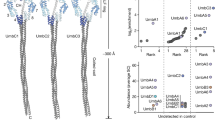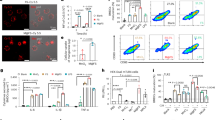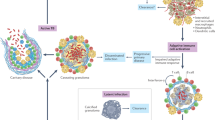Abstract
Trypanosoma cruzi, the causative agent of Chagas' disease, is transmitted primarily by blood-sucking reduviid bugs. The insects themselves are infected by ingesting trypomastigotes with the blood of infected mammals. On ingestion by the vector, the parasites convert to epimastigotes which multiply within the lumen of the crop and midgut. In the hindgut and rectum of the reduviid, the epimastigotes transform into non-dividing metacyclic trypomastigotes which can, when passed with the faeces, infect the vertebrate host1. Lectins capable of binding T. cruzi have been isolated from different regions of the vector's intestinal tract2,3. It has been proposed that the interaction of these lectins with the surface membrane of the parasite regulates the morphogenesis of T. cruzi in the gut of the vector2,3. In the present study we describe the inhibition of epimastigote to trypomastigote differentiation in vitro by a monoclonal antibody specific for a 72,000 molecular weight cell-surface glyco-protein of T. cruzi and propose that this molecule may be a receptor controlling parasite differentiation in the vector.
This is a preview of subscription content, access via your institution
Access options
Subscribe to this journal
Receive 51 print issues and online access
$199.00 per year
only $3.90 per issue
Buy this article
- Purchase on Springer Link
- Instant access to full article PDF
Prices may be subject to local taxes which are calculated during checkout
Similar content being viewed by others
References
Brener, Z. A. Rev. Microbiol. 27, 347–388 (1973).
Pereira, M. E. A., Loures, M. A., Villalta, F. & Andrade, A. F. B. J. exp. Med. 152, 1395–1407 (1980).
Pereira, M. E. A., Andrade, A. F. B. & Riberio, J. M. C. Science 211, 597–600 (1981).
Sher, A., Crane, M. & Kirchhoff, L. V. J. Protozool. (in the press).
Snary, D., Ferguson, M. A. J., Scott, M. T. & Allen, A. K. Molec. biochem. Parasit. 3, 343–356 (1981).
Goding, J. W. J. immun. Meth. 20, 241–252 (1978).
Hudson, L. & Hay, F. C. in Practical Immunology, 183 (Blackwell, Oxford, 1976).
Author information
Authors and Affiliations
Rights and permissions
About this article
Cite this article
Sher, A., Snary, D. Specific inhibition of the morphogenesis of Trypanosoma cruzi by a monoclonal antibody. Nature 300, 639–640 (1982). https://doi.org/10.1038/300639a0
Received:
Accepted:
Issue Date:
DOI: https://doi.org/10.1038/300639a0
This article is cited by
-
Structural variation in the glycoinositolphospholipids of different strains ofTrypanosoma cruzi
Glycoconjugate Journal (1996)
-
Glycolipid and protein profiles in trypanosomatids
Parasitology Research (1994)
-
Carbohydrate immunity in American trypanosomiasis
Springer Seminars in Immunopathology (1993)
-
Purification of metacyclic trypomastigotes ofTrypanosoma cruzi andTrypanosoma dionisii from culture using an epimastigote-specific monoclonal antibody
Parasitology Research (1987)
Comments
By submitting a comment you agree to abide by our Terms and Community Guidelines. If you find something abusive or that does not comply with our terms or guidelines please flag it as inappropriate.



